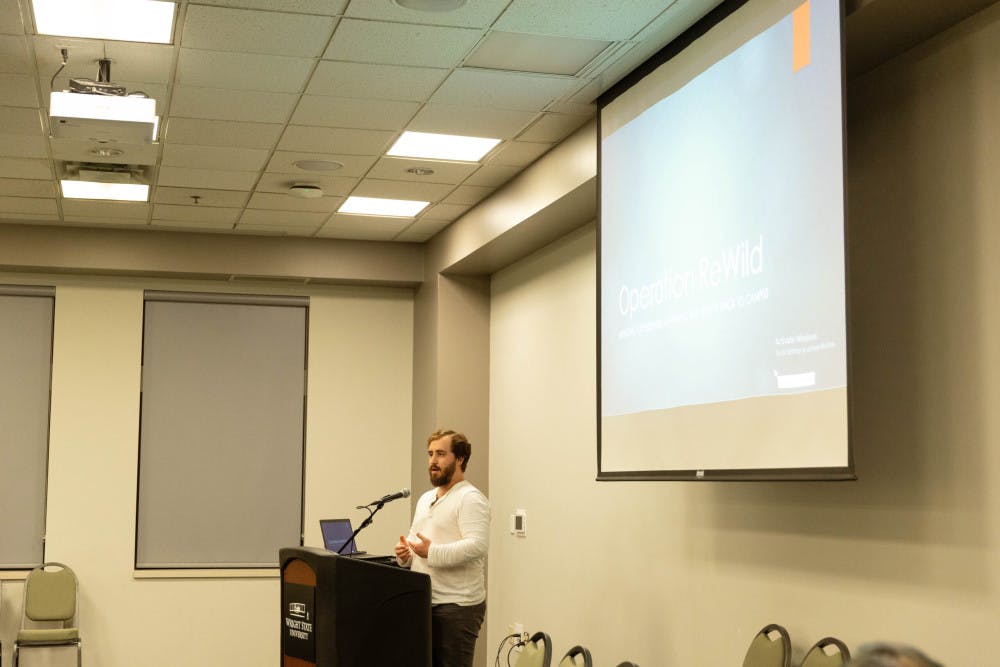SGA Meeting 9/12 | Photo by Bethany Althauser | The Wright State Guardian
Wright State’s Student Government Association held its second weekly meeting of the school year on Sept. 12 and discussed campus projects and parking passes.
Campus beautification project
Hannah Davidson, senator for the College of Science and Math, motioned to table the initial beautification project involving the Indigenous American Culture Student Association and the Asian and Native American Center.
Brad Kerry, the event coordinator for IACSA and president of Astronomical Collaboration, spoke at the Sept. 12 meeting to propose an alternative that would still beautify the campus. Kerry proposed his project “Operation ReWild,” a project that Kerry hopes will provide both experiential learning and campus beautification.
Operation ReWild
Kerry’s idea has four main points, the first being where to plant. The planting will take place in non-utilized turf areas on campus as well as those with a topography conducive to growing.
Kerry specified that he is not wanting to touch areas that are actively used for programming, such as the North Lawn or the Quad, but rather areas near the Math and Microbiology building that are not utilized. Kerry would use the Environmental Protection Agency’s ecoregion mapping to determine what types of plants would thrive on campus.
The second point was identifying what species will be beneficial to campus. Kerry provided some examples, including flowering dogwood, oak trees, milkweeds, goldenrods and more.
The third point was demonstrating other campuses that had success with a similar program. Kerry mentioned Arizona State University, Baldwin Wallace University in Ohio, Indiana University, Ohio State University and Wilbur Wright University in Illinois.
The final point was a few suggestions for grants that Wright State could utilize to afford such a project. Kerry estimated that the final cost of the project would be around $1.5 million at the end of his projected 5-year plan. Kerry mentioned the Land and Water Conservation fund in Ohio that can cover anywhere from $50,000 to $500,000 of the project. He also mentioned the United States Department of Agriculture and Department of Interior grants, National Wildlife Foundation and World Wildlife Foundation grants and local grants or donations.
Some benefits Kerry mentioned include potential tax breaks for Wright State if the areas are designated as wildlife reserves, experiential learning for biology and ecology students, increased biodiversity on campus, decreased lawn care costs, a decrease in the Canadian goose population on the main campus and increased beauty on campus.
SGA’s involvement in Operation ReWild
Kerry brought this to SGA’s attention in hopes for them to work with the Board of Trustees and the Faculty and Staff Sentates to get this plan in motion. He was also hoping for a resolution and possibly a committee to ensure the continuity of this plan. Although Kerry does not currently have a team for this project, he does state that there is immense campus interest.
“I believe that I sent Aliesha [Knauer, Vice President of SGA] something like 80 emails from different students, and I also have a survey with 107 more that are interested,” Kerry told SGA.
Visitor passes for residential areas
Commuter Senator Selvin Bacon-Velasquez spoke on the importance of visitor passes for visitors who wish to stay in residential areas overnight.
“We highly encourage students to know that they should get a temporary permit, which is approximately $9 for the week and allows them to stay on campus overnight, and they will not get fined,” Bacon-Velasquez said.
The next SGA meeting will be on Sept. 19 at 8 p.m. in the Student Union Atlantis A/B room.










